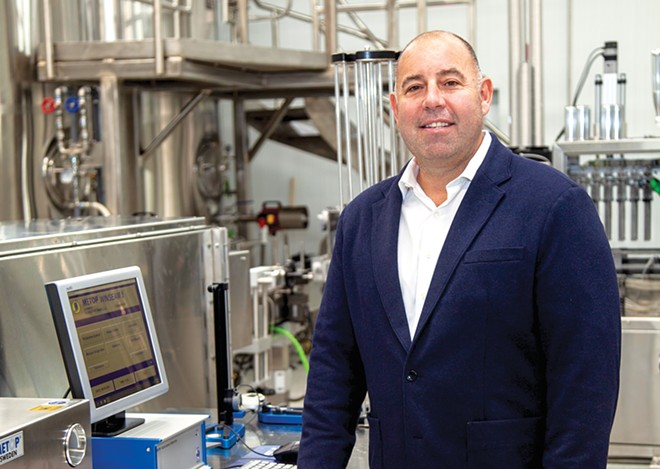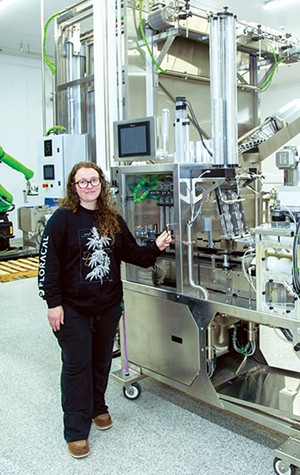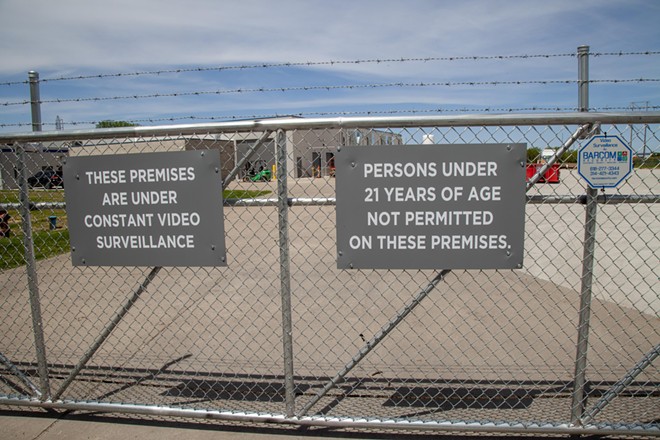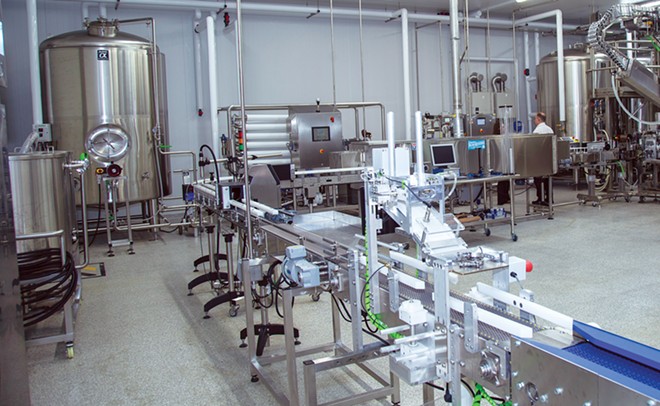The small-scale, $8 million marijuana cultivation center expected to open in June on Springfield's northeast side would be the largest site of its kind in the state, and perhaps the nation, to produce beverages infused with cannabis and hemp oil.
So says Christopher Stone, a Springfield-based cannabis entrepreneur and managing partner of CoPack Industries, 3451 Lumber Lane. CoPak is on track to become the Springfield area's first "craft grow" to join Illinois' $1.6 billion-a-year legal cannabis industry.

Stone, 52, and his fellow investors are betting on the growing popularity of cannabis- and hemp-infused beverages and the interest of young adults as a potentially safer alternative to alcoholic drinks, and without the risk of hangovers.
"They are more conscious about what they are taking into their bodies," Stone said.
The category that's one of the fastest growing in the cannabis industry is edible products, including candy-flavored gummies and beverages. Cannabis beverages make up 1% to 3% of all cannabis sales globally, amounting to between $1.23 billion and $2 billion in 2023.
"If we got to 20% in the next 10 years, that would be pretty incredible," Stone said. "And I think it's possible."
Industry analysts from Future Market Insight predict the worldwide cannabis beverage industry will be worth almost $5.9 billion by 2033 – a compound annual growth rate of 17%. And data from Headset, which bills itself as a "business intelligence platform for the cannabis industry," indicate the popularity of cannabis beverages has grown 40% in North America since 2021.
Illinois officials don't break out infused beverages in their reports of cannabis sales. Beverages are lumped with gummies and other products infused with "liquid marijuana." That product category accounted for $1.9 million, or 1.3%, of the $148.9 million in retail cannabis sales in March, according to state data.
CoPack's goal is to produce 9.6 million canned beverages in the first year and reach maximum capacity – 20 million cans – within two years, Stone said. He plans to do that with about 15 employees, though he said the untapped potential of infused beverages in Illinois and nationwide could help the facility expand over the next decade to 150 million cans per year produced by 50 employees.
Stone said he isn't able to make revenue or profit projections for CoPack yet. But based on low-end wholesale price estimates of $2 to $3.50 per can, it appears the business could generate gross revenues of $19 million to $33 million in the first year and $70 million or more annually after that.
Stone said CoPack Industries – originally founded as Cyclone Labs when it won one of the state's initial 88 craft-grow licenses – will be unique in that it will handle everything under one roof in a 20,000-square-foot building near farm fields and a few businesses east of Interstate 55 and south of Camp Butler Road.
Craft grows, as well as huge cultivation centers such as the 168,000-square-foot Cresco Labs site in Logan County outside Lincoln, have state authorization to create infused products and other cannabis-based products on-site as part of their state licenses. Their products can be sold only in state-regulated dispensaries in Illinois.
Craft grows in Illinois are allowed to have up to 14,000 flowering plants at a time, with each plant requiring about one square foot or more of indoor space. The state allows the facilities to start out with 5,000 plants and then expand by 3,000 plants at a time if they are successful.

The company will grow the marijuana plants it will use to extract and distill oil containing specific concentrations of the psychoactive chemical compound THC, or tetrahydrocannabinol.
CoPack will take that oil and infuse it in beverages – mostly 12-ounce cans – as part of recipes owned by another company, Springfield Seed, made up of CoPack investors and other central Illinois investors, Stone said.
"Everything in this facility will go into oil-based THC products," he said.
CoPack also will can THC-infused beverages based on brand-specific recipes owned by other companies, including Los Angeles-based CANN – a major player in the infused beverage industry.
"Everything's in one shop," Stone said. "It's more efficient, less costly and provides a benefit not only to the contract canning clients but also to the local economy. This is a better system for producing a better product."
Stone said he hopes restrictions loosen at some point so infused beverages can be sold in bars, restaurants and other places where only people 21 and older can buy them.
But drinks infused with THC from hemp – the same species of plant as marijuana but with lower THC levels – can be sold at restaurants, bars and supermarkets, and shipped across state lines because of a lack of regulation in Illinois and many other states.
"What we're trying to do is develop a portfolio of brands, whether we own them or whether we contract-manufacture, that we can sell out into the marketplace," Stone said.
The contract-manufacture arrangement in the beverage industry is known as copacking. The Red Bull energy drinks are a prime example, Stone said. Red Bull pays other companies to produce its recipes.
CoPack Industries is able to begin canning hemp-derived beverages without state approval, but the company is pursuing approval from the ag department to can hemp-derived beverages and beverages infused with regulated cannabis in the same facility.
What's involved in CoPack Industries
The building that houses CoPack Industries has been renovated and equipped with lighting, watering and temperature-control equipment to produce a marijuana crop every 10 to 13 weeks. Rooms with ceilings 12 to 18-feet high are used to start plants from cuttings, establish root systems, grow marijuana flowers that produce THC, then cut and dry the harvested plants.
There's a barbed-wire fence around the six-acre property and more than 250 video monitoring cameras inside and outside as part of a $1 million security system that includes facial-recognition technology for real-time and archived video footage.

Each plant grown is tracked, based on state rules, and each batch of plants used for infusion will be recorded with bar codes on each can, Stone said.
The heart of the operation is the cannery room. It features an automated assembly line with two 1,200-gallon beverage processing tanks that are two stories tall, as well as equipment to carbonate, pasteurize, put beverages in cans, then seal and package four-packs and six-packs for shipping. The equipment can accommodate various sizes of cans and bottles, depending on clients' needs, Stone said.
CoPack Industries Chief Operating Officer Justin DeWitt, a mechanical engineer and former chief of staff at the Illinois Department of Public Health who oversaw COVID-19 operations, said the canning process at CoPack will be "no different than at Anheuser-Busch, just on a smaller scale."

The room's canning equipment is made by Alpha Brewing Operations in Lincoln, Nebraska, which makes the same sort of canning equipment used by craft beer breweries and soda manufacturers.
Springfield Seed's initial beverages to be produced are all fruit-flavored and lightly carbonated: papaya and lime, cucumber and lime, guanabana and a lemonade iced tea. Users of the products won't taste or smell the marijuana used to produce them, Stone said.
CoPack would purchase cannabis distillate for infusion until its first crop is harvested. Hemp oil emulsion would be purchased for infusion in beverages, and hemp wouldn't be grown at the site, Stone said.
The need for hemp regulation
Illinois, like most states, hasn't enacted legislation to regulate hemp, which was legalized for production by Congress in the 2018 farm bill. The lack of regulation has led to products, including infused beverages that contain low levels of THC, to be sold in gas stations, liquor stores and supermarkets to anyone, including children.
Legislation has passed the Illinois Senate, but remains pending in the House, that would regulate sales of THC products from hemp. Even though CoPack has a financial stake in the growing popularity of hemp-infused beverages, Stone said he supports the legislation.
He said CoPack wants to ensure that people younger than 21 don't have access to THC products. He also wants the state to require THC content to be disclosed on labels and purity standards enforced.
These requirements all are part of House Bill 4293, which passed the Illinois Senate on May 26 but didn't receive a vote in the House before that chamber adjourned its spring session on May 29.
"It's still a psychoactive product that you shouldn't allow kids to get ahold of," Stone said. "It's an intoxicating beverage. We can't have 6-year-olds drinking this or 11-year-olds going out and buying and drinking it."
The House still could consider HB 4293 when lawmakers return to Springfield for the fall veto session in November.The U.S. Food and Drug Administration cautions that products infused with hemp, also known as Delta-8 THC, haven't been evaluated by the agency or approved for safe use.
The FDA said it received 104 reports of adverse events in patients who consumed delta-8 THC products between Dec. 1, 2020, and Feb. 28, 2022. Of the reports, 77% involved adults, and 8% involved patients younger than 18. The other 15% of reports didn't contain an age. The adverse events "included, but were not limited to, hallucinations, vomiting, tremor, anxiety, dizziness, confusion and loss of consciousness," according to the FDA.
Marijuana, as well, has been linked to adverse health effects, though limited research has also linked the substance to positive effects. According to the National Institute on Drug Abuse, marijuana affects brain development.
"When people begin using marijuana as teenagers, the drug may impair thinking, memory and learning functions and affect how the brain builds connections between the areas necessary for these functions," the institute says on its website. "Researchers are still studying how long marijuana's effects last and whether some changes may be permanent."
The future of THC-infused beverages
More research on the health impact of marijuana is expected if the U.S. Drug Enforcement Administration moves forward with its plan to declassify cannabis as a less-dangerous drug, though the move wouldn't legalize marijuana at the federal level.
Stone and DeWitt see THC-infused beverages only growing as the smell of smoked marijuana on public roads, parks and other places becomes more and more unpopular.
"Like cigarettes, people are going to get sick of it, if they already aren't sick of it," Stone said.
CoPack is taking advantage of thousands of years of social norms, he said.
"Drinking is socially acceptable," he said. "It's also the most popular way in terms of how you socialize with people when you go out. Think how many people drink coffee, how many people drink energy drinks, how many people drink alcohol."
Added DeWitt: "You hear people say, 'Let's go out for a drink together' way more often than they say, 'Let's go smoke a joint together.'"
Stone said he won't try to convert the 17% of Americans who told the Gallup Poll in 2023 that they smoke marijuana. He wants to convince the 83% who don't to try infused beverages instead of alcohol.
"As much as I like to have an 'old fashioned' or to have a vodka water, the amount of damage it does to your body over time, if you continue to do it, is substantial," Stone said. "And in this situation, there a lot less risk in damaging your body by using a regulated cannabis or hemp-derived product than alcohol."
Dean Olsen is a senior staff writer at Illinois Times. He can be reached at 217-679-7810, [email protected] or twitter.com/DeanOlsenIT.



















